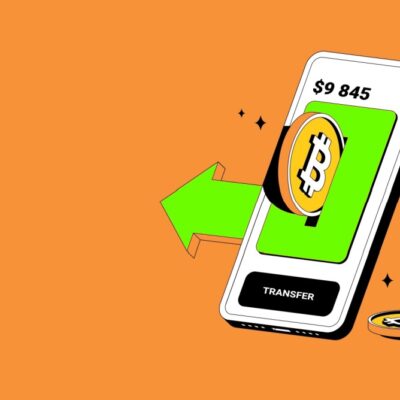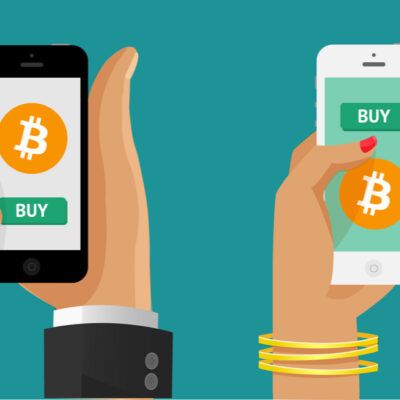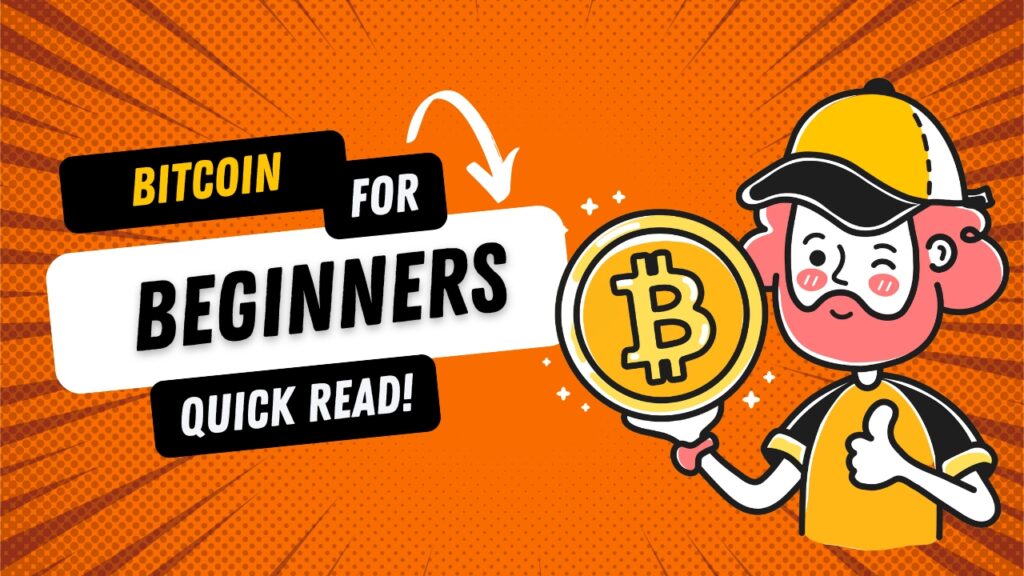
There’s only one Bitcoin, but there are a bunch of different ways to “buy Bitcoin”. The first couple of options below will be the most common and best ways to buy Bitcoin. The goal of buying Bitcoin is to be able to actually take custody of the asset, not just track the price. Bitcoin is about more than just getting rich. After that, I’ll cover a couple of ways to “acquire” Bitcoin, rather than buy it directly. This is basically purchasing mining equipment and mining your own Bitcoin. Doing so isn’t easy, but is still an option.
Lastly, I cover a few ways to track Bitcoin’s price, which is different from buying Bitcoin, but worth considering in some situations, like if you want to benefit from Bitcoin’s price in a tax-advantaged stock brokerage account.
Before you get started, though there’s a total of 10 options below, you really should strive to achieve #1. If that’s too much for you right now, start with #2, then graduate to #1. Bitcoin is “freedom money” and you can’t get the freedom part if someone else controls the private keys. Then it’s just money. BTC money is still better than USD money, but it’s even better when you take on the responsibility of full ownership.
10 Ways To Buy Bitcoin
1. Buy & Hold Your Own Private Keys

The best way to buy Bitcoin is to use an exchange then withdraw to your own wallet where you control the private keys. There are many Bitcoin exchanges out there these days, so you have a range of choices based on where you live, your goals for buying Bitcoin, and your general preferences for design or features.
For example, you could do recurring buys and automatic withdraws from Swan Bitcoin. You could do a large one-time purchase from River which has a $100,000 one-time buy limit. You could buy on Unchained and withdraw to a multisig vault. Though there are many more cryptocurrency exchanges to choose from, like Kraken, I prefer to use Bitcoin-only businesses. Everything else is a distraction, and by specializing in just one cryptocurrency, you typically get better security and cheaper fees due to the lack of overhead of dealing with a hundred other tokens.
Withdraw Your Bitcoin From The Exchange!
The key step after buying your Bitcoin is to withdraw it to a wallet where you control the private keys. This could be a simple mobile wallet like Blue Wallet (again, I recommend Bitcoin-only), or it could be a dedicated, physical hardware wallet. You could get a little more advanced and do a 2-of-3 multisig hardware wallet setup, but that’s a little more advanced, and most useful if you start accumulating a large amount of Bitcoin.
Holding your private keys is one of the biggest and most important steps to true ownership of your money. While it’s nice to participate in the dollar gains of buying Bitcoin and watching the price go up, growing your wealth is just part of the Bitcoin story. There are many more benefits to owning Bitcoin beyond fiat dollar gains.
Related Content
2. Buy & Hold On An Exchange

Though it’s not ideal, many beginner Bitcoiners are not confident enough to hold their own keys and would rather leave their Bitcoin with a custodian. This isn’t a bad way to start, but at the very least you should strive to hold your own keys in the future.
The reason this is not an ideal setup is that by having your Bitcoin on an exchange, it’s really not your Bitcoin. It’s a Bitcoin IOU. You may see a number on the screen that says how much Bitcoin you have, but behind the scenes, everyone’s Bitcoin is mixed up in various types of secure storage systems. The exchange, for sure, will give you the amount of Bitcoin they owe you, but they may not give you the exact same Bitcoin you deposited.
Plus, they control the Bitcoin now. One of the main benefits of owning Bitcoin is financial freedom. If there’s a private company that requires a photo of your driver’s license and facial verification to withdraw your funds – that’s not financial freedom. If you signed a terms of service agreement saying that a custodian can lock your account if they suspect fraud, that’s not financial freedom.
Keep in mind that Bitcoin works differently from the traditional banking system.
There have been many exchange hacks in the past, and once your Bitcoin is gone – it’s gone. These are not billion-dollar multinational institutions with accounts at The Fed that can just replace your stolen dollars.
You can’t make more Bitcoin.
When Bitcoin Is Gone, It’s Gone
In many cases, when there was an exchange hack, users had to bite the bullet and accept a total loss of funds. In other cases, exchanges were able to make users whole and save themselves a lawsuit. How will your exchange behave in a catastrophic event? You can’t really be sure until it happens.
That being said, exchange hacks are much less frequent now, especially if you use a top-tier, well-known, Bitcoin-only exchange, and you’ve read about their security practices. If you add other security measures to your personal account like 2FA, address whitelisting, email verification, or even opt-in to some kind of “vault” cold storage, you can at least prevent user error on your part. Exchange hacks are one thing, but individual user account hacks happen as well.
Bitcoin cannot be hacked. Accounts and exchanges can be.
I don’t mean to scare you from buying Bitcoin if you aren’t a hardcore hackerman™. Your funds are *likely* safe on modern exchanges, assuming you take reasonable security practices like not making your password “password”. However, don’t assume that a custodian will protect your money better than you can with a little bit of education and care.
3. Buy Bitcoin From A Bitcoin ATM

You might have seen a Bitcoin ATM somewhere in the wild like at a local gas station, or maybe your local Coinstar at the grocery store now offers Bitcoin as a method of payment. You can use these machines to buy Bitcoin in your local area.
This is actually a cool way to buy Bitcoin because it’s almost KYC-free, meaning you can buy Bitcoin without attaching it to your private information like Social Security number or IP address. I say “almost”, because, at least in my experience, I needed to supply a phone number to complete the transaction, and your phone number these days is most like tied to your Social Security number.
However, if financial privacy is a priority, you could still get a non-KYC phone number via prepaid sim card in many places, or you could deposit your Bitcoin to a wallet not associated with your phone number and coinjoin afterward. Depending on your desired level of privacy, you may need to take additional steps afterward, but the point is that buying Bitcoin with cash from an ATM is a lot more private than most exchanges where they require your Social Security number, pictures of your ID, and maybe even a digital scan of your face.
Set Up A Bitcoin Wallet Before You Go
To buy Bitcoin from an ATM, you’ll need a wallet set up before you go. It’s very easy to set up a Bitcoin mobile wallet, and you can deposit directly into your wallet from the ATM after you deposit cash.
If you are buying a small amount of Bitcoin, and assuming you have your seed phrase written down, it’s OK to leave a small amount of Bitcoin on your smartphone. This is known as a “hot wallet” because it’s always connected to the internet. If your phone is compromised (even if it’s just a friend borrowing the phone), you could lose your Bitcoin this way! It’s not recommended that you store large amounts of Bitcoin on your phone wallet.
If you do plan to make a large purchase through an ATM, your Bitcoin hardware wallet may have QR code capabilities and a battery function (like with the Keystone Wallet) that will allow you to withdraw directly to cold storage.
4. Get Bitcoin From Hosted Mining

You can “buy Bitcoin” by buying Bitcoin miners and mining Bitcoin yourself! In the past, mining Bitcoin was simple and could be done on any laptop, but these days it requires specialized equipment. An additional layer of difficulty is added when you find out that Bitcoin miners are in high demand, and currently very hard to source due to the global chip shortage.
You can’t just hop onto Amazon and buy a Bitcoin miner! (OK, you could, but it would cost you 2x-3x the true value of the machine).
To simplify the mining process. there are now “hosted mining” companies, which will source machines for you at a reasonable cost, plus find you rack space and electricity to run the machines.
If you’re just getting started with Bitcoin, you may not know it, but there’s a lot of economic calculations when it comes to mining Bitcoin. You have to figure out how much a miner will cost you, where you’re going to run the machine, how much electricity will cost, how often you’ll need to maintain the machine, if you want to customize the firmware, and a bunch of other stuff.
It’s not super easy to successfully and profitability mine Bitcoin these days. However, it’s a lot easier with hosted miners like with Compass Mining or Musk Miners.
I haven’t done this process myself, so can’t get super detailed into how it works, but basically you buy a Bitcoin miner through a broker. They then find a spot to run your miner, usually in the USA or Canada. They take care of setting your miner up and maintaining it, and whatever share of Bitcoin it earns by connecting to a mining pool, they then send to your Bitcoin address.
Is this better or worse than just buying Bitcoin?
More Costs To Factor In
Other than the cost to purchase and set up the miner, you also have to factor in monthly electricity and hosting costs. Plus, each miner you purchase has the possibility of firmware or hardware issues to consider. There are more risks to consider here! You also don’t know what hashrate will do in the future, so your miner mining equipment may become obsolete in the near future, or its profitability could fluctuate.
On the flip side, you are basically buying a money-printing machine. You’ll get Bitcoin deposited into your account every day, and eventually, your miner will pay for itself. After that, anything you mine is pure profit! Plus, you can depreciate your miner on your taxes, and can even resell your machine at a later date.
Bitcoin mining ASICs are having a longer and longer lifespan these days, so you may be able to get a decent price for it in the future, or in some cases, even sell it for more than you bought it!
5. Mine Your Own KYC-Free Bitcoin At Home!

This option is very much for Bitcoin enthusiasts and people who love to tinker. Acquiring a popular miner like the S9, or S19j Pro is going to require a long process of sourcing a second miner online, getting it shipped, then figuring out how to actually mine with it.
Miners are notoriously LOUD and HOT, so if you are mining Bitcoin at home, you need to find a creative solution to mitigate the noise and heat from even just a single miner. There are additional steps beyond that as well.
This isn’t a plug-n-play solution.
That being said, it’s still possible to mine Bitcoin at home, and though it does require a strong desire to do so, plus some ingenuity. It’s not like you need uranium and a PhD to get it done. With some basic equipment, curiosity, and online tutorials, you can get there.
There are several advantages of doing this.
- fun and challenging hobby
- contribute to Bitcoin mining hashrate distribution
- KYC-free Bitcoin for the lifetime of the machine
I don’t know if it’s a temporary trend or a change in direction due to the hashrate exodus from China, but there has been an uptick in interest in home mining rigs.
Here’s one from @SGBarbour, building a home mining rig similar to his Hash Hut designed for commercial use on oil wells.
6. Peer-To-Peer (P2P)

There’s actually a couple of ways you could consider a peer-to-peer purchase of Bitcoin.
One, you could buy some from a friend. If you have a friend who’s got some Bitcoin, you can give them physical cash or send them money with a payment app like Paypal, Venmo, or Cash App, and they can send you some Bitcoin in return. You can look up the price of Bitcoin for the day, decide on an approximate exchange rate, and the amount you want to swap. Easy.
You could also use a p2p exchange. In the past, you could actually meet up with people in meatspace to exchange cash for Bitcoin, but I’m not sure if they do that anymore due to safety issues. Most of the time it was only practical in big cities anyway, so it could be just an online person-to-person thing now. PayPal and Zelle seem to be common methods of purchase at this time. I haven’t used this site, but it’s one of the most popular ways to buy Bitcoin directly from another person.
Why Use P2P?
One popular example is the online exchange Bisq, but there are others like Hodl Hodl, Robosats, and Peach. There are many ways to buy bitcoin through these p2p apps including postal money order, Paypal, Zelle, and gift cards.
One advantage of P2P exchanges is that the Bitcoin you buy will be completely anonymous (KYC-free), unlike when you buy from an exchange where your Social Security number, phone number, physical address, and other private information is tied to your Bitcoin.
You can also sell your gift cards for bitcoin, so you don’t even need fiat cash currency to buy bitcoin online.
However, it does require a few more steps to get it this way, so it’s usually not recommended for beginners who want to get started in the fastest and easiest way.
Video: How To Buy Bitcoin Privately
From here on out, we’re buying fake Bitcoin.
#7-#10 on this list are basically ways to use dollars to track Bitcoin’s price action, and you won’t actually own any Bitcoin.
7. Buy $GBTC Stock
The $GBTC stock is the Greyscale Bitcoin Trust fund. It’s basically a company that buys and holds Bitcoin, then investors can buy shares in the company rather than directly buying Bitcoin. This way you get exposure to the Bitcoin price, without actually holding the private keys to your Bitcoin. It’s an easy solution for large investors to get in on the price action without the responsibility or paperwork of owning the asset.
As a buyer of the $GBTC stock, however, you’re purchasing shares of the company on the secondary market. This stock is available with most stockbrokers, so one huge advantage of buying the stock is that you can own it in a tax-advantaged account very easily. If you have a Roth IRA set up, and buy $GBTC, you can profit from Bitcoin’s exponential price gains in a tax-free way. Plus, if you’re young and 20-30 years or more away from retirement, you can really start to fantasize about what Bitcoin’s price could be in 30 years.
The Problem With Buying $GBTC
My main issue with buying $GBTC is that you aren’t buying real Bitcoin. Though the fund does buy real Bitcoin, so the value behind the company is backed by Bitcoin, you don’t own the asset yourself. You are basically just owning a unit of stock that approximately tracks the price movements of Bitcoin over time.
There are a few additional issues with $GBTC.
One is that the price doesn’t track Bitcoin exactly. You don’t buy one share of $GBTC and it’s worth exactly what Bitcoin is worth, so for your average investor, it’s difficult to know whether you’re buying the stock at a discount or at a premium.
That leads me to the next disadvantage, which is that sometimes the stock trades at a premium or discount to the Bitcoin price. That means you could be paying more per share than if you bought Bitcoin directly, or if you sell, you could be selling it for less. There’s a whole dynamic at play since only certain investors can buy into the fund directly, and those funds are locked up for a period of time. The shares you’d buy are being sold on the secondary market.
When you consider there’s a 2% management fee, competition in the space for similar products, the potential to move to an ETF structure, and the fact that at times $GBTC trades on its own dynamics independent of Bitcoin price movements, it’s not a perfect way to own Bitcoin unless you really want some in a tax-advantaged account and don’t want to do the paperwork to create a self-directed IRA.
There is also controversy surrounding the company and related entities around whether or not they are solvent, or how they manage the fund. There’s currently a very public campaign to force Grayscale to liquidate the fund and release the bitcoin to the fund holders.
8. Buy A Bitcoin ETF
Right now (2021), there’s no Bitcoin ETF in the USA, so the closest thing to an ETF would be the Bitcoin Trust mentioned above. Canada has a couple though. The three right now are $BTCC, $BTCX, and $EBIT. These are not available to US investors. There are a bunch of companies like ARK trying to get a Bitcoin ETF approved in the US, but it hasn’t happened yet.
9. Buy Bitcoin Mining Stocks
One of the big criticisms of gold from legacy financial gurus like Warren Buffet is that he’d never buy gold because it doesn’t produce anything. It’s just a rock. However, after COVID and the crash of March 2020, Berkshire Hathaway bought Barrick Gold, a gold miner. I guess his thinking would be that as the price of gold rises, gold miners will become more profitable, so he gets to benefit from increasing gold demand without actually owning a rock.
Buffet hates Bitcoin, but that doesn’t matter for this analogy. Bitcoin miners work a lot like gold miners, except it’s a lot more interesting. Imagine being a gold miner but you could pack up your mine and move it to anywhere in the world! (In fact, that’s exactly what’s happening right now as I write this. China banned Bitcoin mining a couple of weeks back so Chinese miners are shipping their ASICs (Bitcoin mining machines) to places like Kazakhstan, Texas, Finland, Canada, and maybe even some to El Salvador.)
Bitcoin Miners Are Companies, Not Bitcoin
Bitcoin mining and the profitability of Bitcoin miners is a whole separate topic from Bitcoin the asset. There are a lot of moving parts when it comes to calculating the profitability and sustainability of Bitcoin mining companies. It’s a sector that is as volatile as Bitcoin the asset, with the added risk that a miner could go out of business.
Investing in Bitcoin mining stocks will require a lot of due diligence on your part unless you just want to YOLO into a position and see what happens.
That being said, this is a super interesting, never seen before industry. Miners could be using 100% carbon-free hydroelectric power, or they could be mining with stranded flare gas in a Texas oil field. They could have deals with the local city for load balancing and profit from selling electricity back to the grid during high demand periods or leveraging nuclear power and geothermal energy from volcanos.
Some examples of publicly traded Riot Blockchain ($RIOT) in the USA and Bitfarms in Canada ($BITF), but there are more out there. The reason these two companies come to mind is that they actually hold Bitcoin on their company balance sheet, so as the price of Bitcoin rises, they get double the benefit. They make more money as they sell Bitcoin on the marketplace, and the value of their Bitcoin holdings rises as well.
10. Buy Bitcoin-Related Stocks
Have you ever heard the story that the people who made the most money in the gold rush in California were the ones selling the miner’s tools, and not the miners themselves? You could use a similar strategy here to benefit from the increasing popularity of Bitcoin, by owning Bitcoin-related stocks. I’ll talk about a few below, but you may be able to brainstorm more companies that might benefit from increased Bitcoin adoption.
One of the most obvious examples is Coinbase ($COIN), which is a cryptocurrency exchange, offering Bitcoin, plus a variety of tokens. One of the main ways they make money is from people trading cryptocurrencies, so it doesn’t matter if the markets are up or down, they still make money.
Another stock to consider is Square ($SQ), since they offer Bitcoin buying and selling through their app. The CEO of Square is Jack Dorsey, and he is a well-known Bitcoin advocate, helping Bitcoin development in a variety of ways. Square is also doing initial research on launching its own Bitcoin hardware wallet as of 2021.
Nvidia ($NVDA) or some other similar company could be another option since they manufacture chips that can be used for mining cryptocurrencies. I don’t think you can use these specific chips for mining Bitcoin, but this isn’t a stock I follow, so do your own due diligence (as with all these companies).
Benefits & Downsides Of Bitcoin Stocks
The benefit of owning Bitcoin-related stocks is that you can do due diligence and look at quarterly reports, P/E ratios, and other metrics to see if a company is worth investing in. Like Bitcoin miners, if they own Bitcoin on the balance sheet, you may also see price movements when Bitcoin moves, as with Microstrategy ($MSTR).
The main downside is that you aren’t owning Bitcoin. This is as about as far from Bitcoin ownership as you can get, so you are basically just investing in stocks and hoping they “go up” as the price of Bitcoin rises. You get none of the benefits of owning Bitcoin and all the risk. A Bitcoin stock isn’t Bitcoin, plain and simple.
Final Thoughts On Buying Bitcoin
Bitcoin is about more than just “number go up“, so if you are going to buy Bitcoin, I highly recommend that you hold your own keys. I would break that goal down into three simple steps.
- Buy A Hardware Wallet & Write Down Your Seed Phrase (12 or 24 words)
- Get An Account On An Exchange & Connect Your Bank Account
- Buy & Withdraw Bitcoin To A “Receive” Address On Your Hardware Wallet
If you’ve never done it before, it can be stressful. There’s no customer support for Bitcoin! However, if you sign up with a high-quality, Bitcoin-only exchange, many times they will have support staff to help you through the process. Bitcoin-only exchanges tend to be pro-Bitcoin not just because they sell it, but because they want you to be able to own the best money that’s ever existed.
Start with a small amount and see what happens. Wipe your wallet, restore your seed, and see your Bitcoin reappear. Gain confidence in using Bitcoin by practicing. Once you get more confident in withdrawing to your own wallet, you can start buying and withdrawing larger amounts, according to how much Bitcoin you’d like to own.
Lastly, don’t forget that buying bitcoin isn’t the only way to acquire it. You can also work for it and earn it!
Further Reading
Frequently Asked Questions
What Is The Smartest Way To Buy Bitcoin?
The smartest way to buy bitcoin is to buy an amount you’d like to save for a period of 5-10 years, and withdraw to self custody using a hardware wallet. Secure your 12-24 word seed phrase by etching it in steel. As an alternative holding method, you can learn about adding a passphrase or construct a multisig wallet
How Do Beginners Buy Bitcoin?
Beginners can buy bitcoin by setting up an account at a bitcoin exchange and learning about self custody with a hardware wallet. You should never leave your bitcoin on an exchange for extended periods of time. Self custody is vital to beginners learning about bitcoin.
What Is The Safest Place To Buy Bitcoin?
The safest place to buy bitcoin will be a bitcoin-only exchange that offers 2FA as an added layer of security for your account. Your bitcoin exchange should also allow for self custody so you can easily withdraw your bitcoin to cold storage. The safest way to store your bitcoin is with a hardware wallet!
Why Is Buying Bitcoin So Difficult?
Buying bitcoin can be difficult because it’s a new asset class and not widely available. However, the barrier to entry is getting much lower, and it’s much easier to buy bitcoin in 2023 than it was in 2009!
Can You Buy Bitcoin In The Bank?
No, you cannot buy bitcoin at the bank (yet), though you can buy bitcoin on many popular apps that work similar to bank accounts like Paypal, Venmo, and CashApp.


















 Should I Sell My Bitcoin?
Should I Sell My Bitcoin?
Leave a Reply